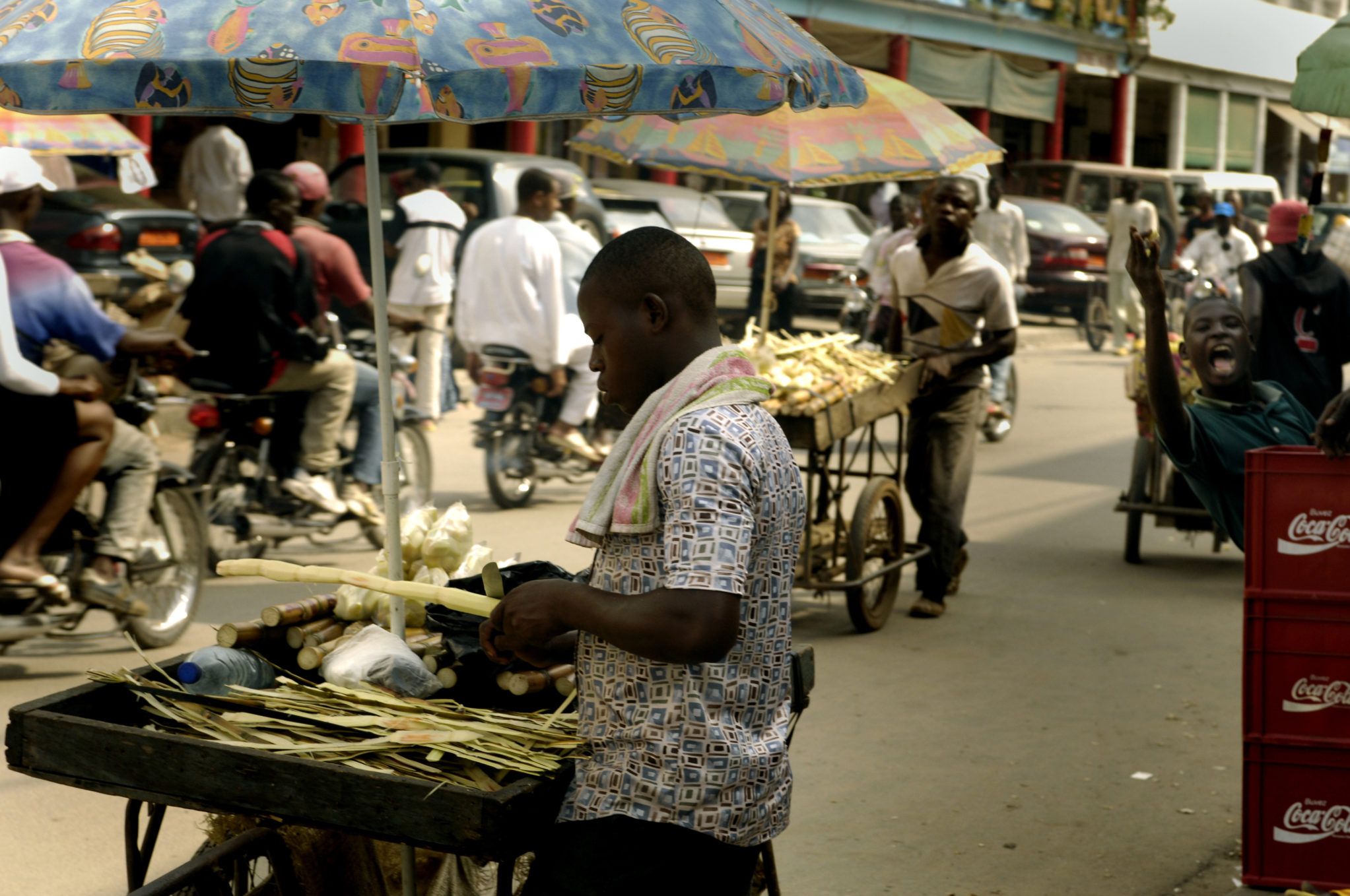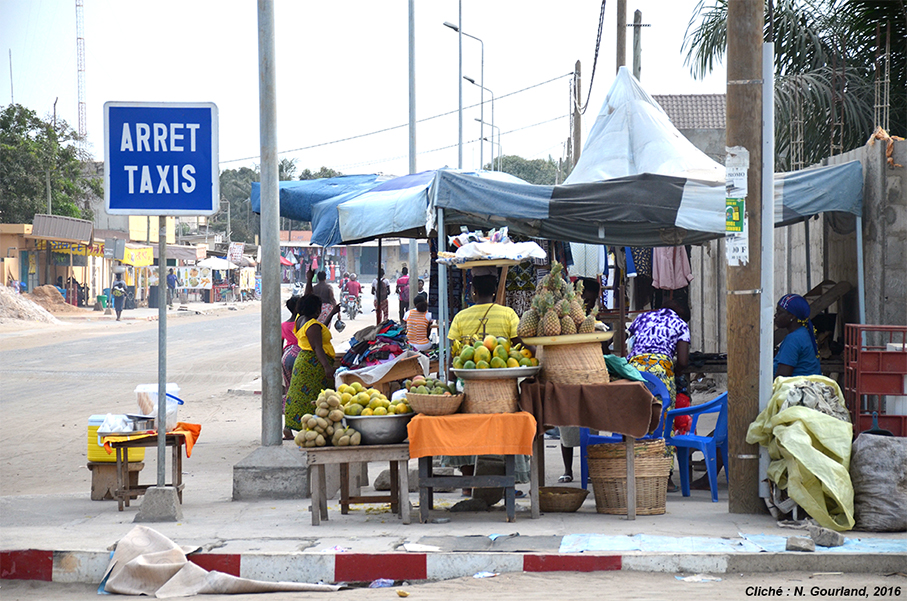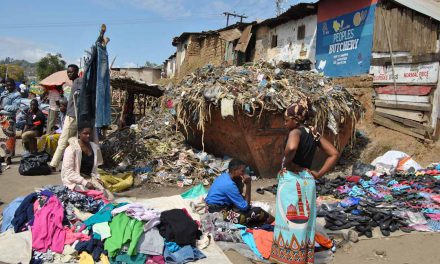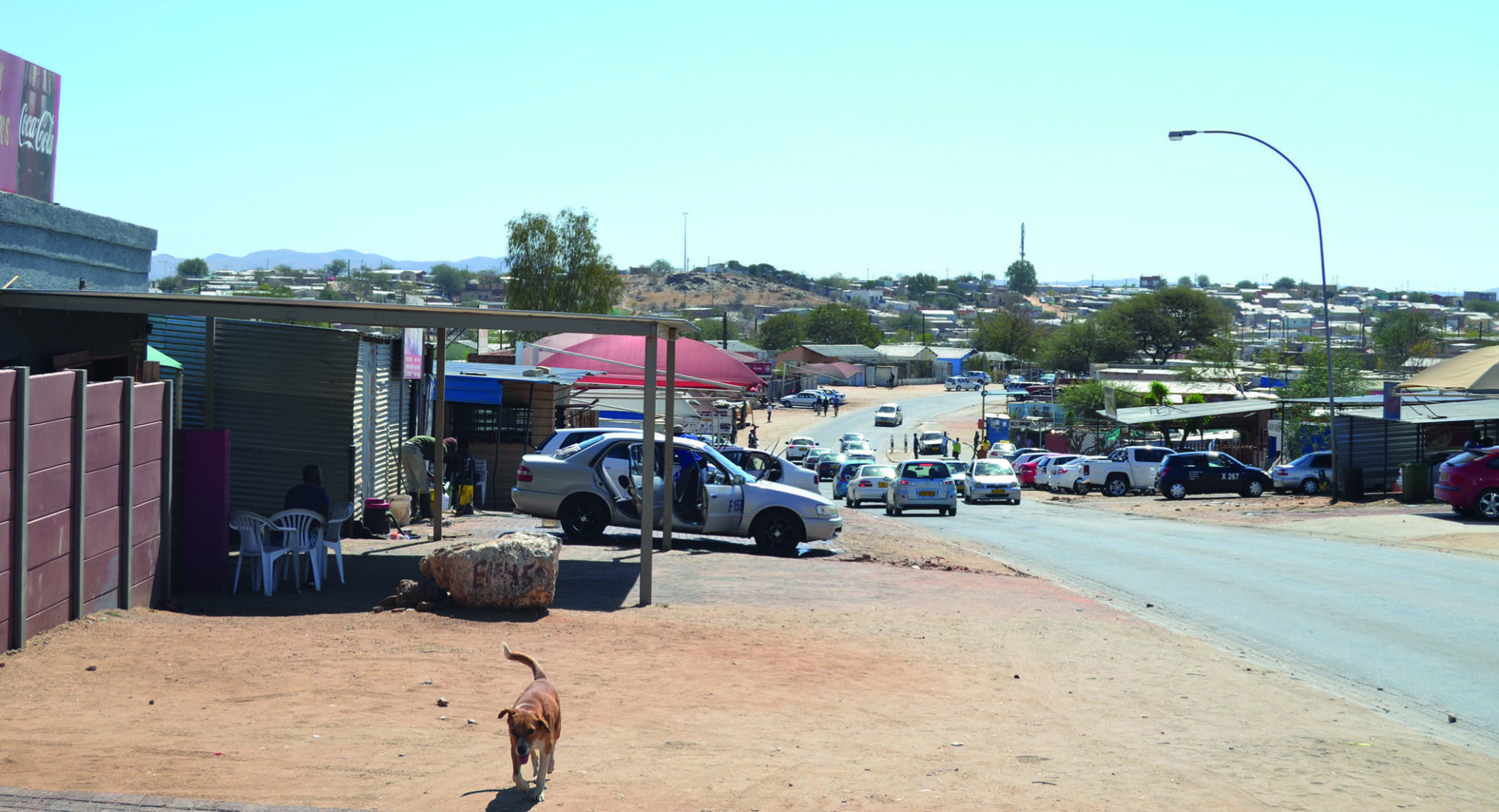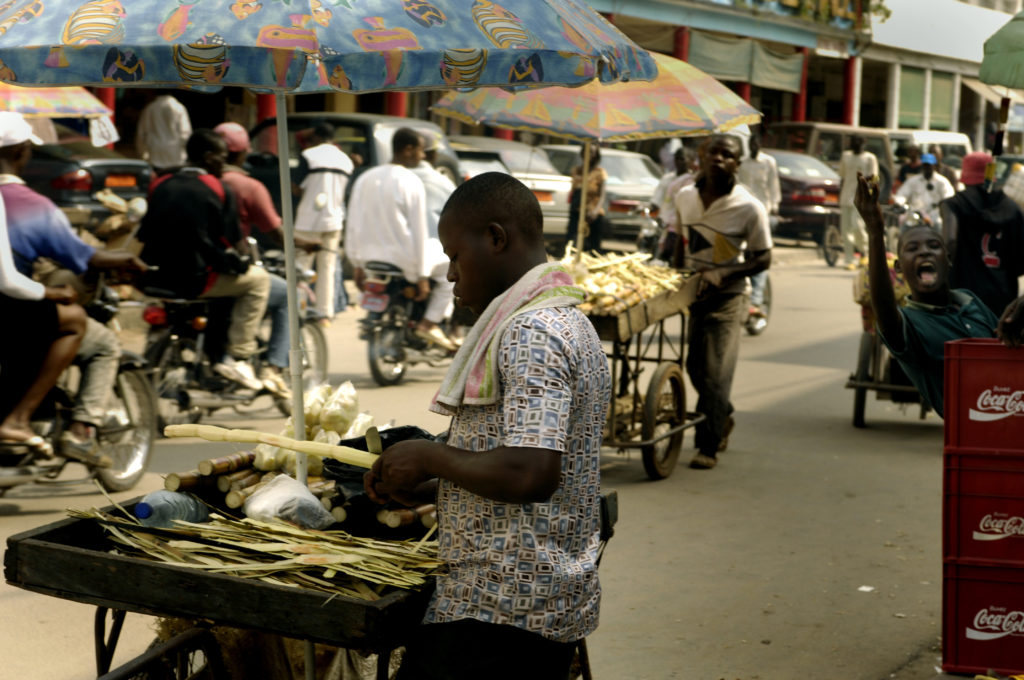
A Douala street vendor prepares his goods in the hope of making a sale in Cameroon. Vendors often sell many items in small quantities so more customers can afford to purchase them. © Wikimedia Commons
Governments need to see informal business people as economic actors who are rational and have good ideas
In Kenya, they are known as jua kali workers – those who labour under the fierce sun. These are the men and women whose hawking, fixing, selling or general hustling oils the wheels of daily life. Despite their ubiquity and industriousness, they belong to what is known as the informal economy – a term for an economic reality that some analysts argue has been misunderstood and abused.
As well as street vendors, the informal economy covers millions of home-based workers, service-industry staff, motorcycle taxi drivers, waste pickers and other workers in mainly developing countries across the world. Despite its size, the informal economy is often either ignored or repressed by national governments.
But as populations grow in developing nations and people continue to feel the effects of the 2008/09 global recession, voices are calling for more nuanced policies that encourage rather than stifle the entrepreneurial spirit that fuels informal economies.
The International Labour Organization (ILO) defines the informal economy as: “all economic activities by workers or economic units that are – in law or practice – not covered or sufficiently covered by formal arrangements”.
Jobs in the informal economy are precarious and poorly paid, and they offer few rights or safety nets, if any. Productivity is low, working spaces are often dangerous and workers can fall prey to corruption and harassment from local officials.
Yet informal businesses require little capital, encourage inventiveness and offer opportunities to make a living for people who are excluded from the formal economy. These paradoxes mean the informal economy can be both a survival mechanism and a poverty trap. Often perceived as backward and disorganised, its actors can also be dynamic and driven by a spirit of entrepreneurialism that would not be foreign in Silicon Valley.
According to the ILO, the average size of the informal economy in sub- Saharan Africa is about 40% of GDP, and represents around three quarters of non-agricultural employment. Recent estimates are that in Africa the informal economy “accounts for 50 to 80% of GDP and as much as 90% of new jobs”, according to a 2014 policy research paper for the World Bank. Yet, many governments still regard this activity as a blight.
Caroline Skinner, urban research director at global network Women in Informal Employment: Globalizing and Organizing (WIEGO), says part of the problem lies in the sector’s name, which she describes as a “lumpy notion” that needs to be broken down into its component parts.
For one thing, she says, policies differ greatly from one country to the next. They can also differ widely as applied to one group or another, whether it be street vendors, waste pickers or home-based workers.
“A different paradigm would say this is very vibrant, dynamic and exciting,” she says. “If you sit on the streets and watch what is going on, there are some really sophisticated businesses. Even your ‘marginal players’ will have thought quite carefully about what an early morning commuter would want to purchase, versus an afternoon commuter. There is a lot of dynamism and economic thinking.”
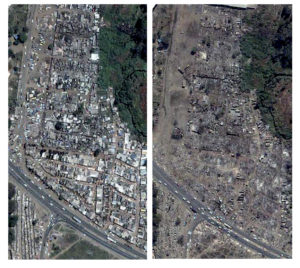
Mbara Township, before and after Operation Murambatsvina, 2005. © Wikimedia Commons
The received wisdom has long been that informal workers must be forced into the formal economy, in return for which they will pay taxes, receive better protection, and eventually grow their businesses. But Skinner argues that this approach could be counter-productive, especially if it seeks to impose sometimes unsuitable western models. “[Governments] have got to see these people as economic actors who are rational and have good ideas,” she told Africa in Fact.
Terence Jackson, professor of cross-cultural management at Middlesex University Business School in London, has studied informal economies, aiming to distill specifically African management structures that could represent an alternative to the imposition of western models. “What I was looking for was the African Renaissance. What is indigenous African management? What does an African organisation look like?” His research led him to conclude that the developing world’s informal economies were an important source of indigenous knowledge.
“‘Indigenous’ doesn’t just mean people existing in a locality. [The concept] is almost against the global. It’s juxtaposed but also opposed,” he says. But, he adds, international financial institutions tend to relegate this kind of knowledge because they do not see it as a valuable part of the global economic discourse.
Skinner, who is also a senior researcher at the African Centre for Cities at the University of Cape Town, agrees that the fact that informal workers have such a weak voice on the world stage is a major stumbling block.
She has been tracking treatment of street vendors globally, and has observed “a continuum” in terms of government policies, ranging from violent antagonism to government engagement with informal workers. An example of the former was seen in Zimbabwe’s 2005 Operation Murambatsvina, which cleared hawkers from city centres.
An example of the latter was seen in council-led efforts in Durban, South Africa to build structures to house vendors, which were the vendors themselves. She believes consultation, rather than the imposition of regulations, is the way forward. The lack of consultation with informal workers can result in net economic losses for the governmental or formal sectors, she points out.
“There are white elephants across the globe: infrastructure that has been put in place and often remains [unused],” she says. “The fundamental problem is not understanding the economics of the informal economy. There is a mantra among street trader activists: ‘nothing for us without us’. You need detailed consultation processes that involve people from the very beginning.”
For Jackson, deeper study of the structures of Africa’s informal economy, and particularly the modes of indigenous, non-western knowledge and entrepreneurship practised there, could yield solid economic benefits. “Maybe the formal economy and organisations working in Africa could learn from the informal economy,” he told Africa in Fact.
Such understanding could lead to new ways of training entrepreneurs to work in specifically African contexts, for example. “The western concept of an entrepreneur appearing on The Apprentice, a go-getter, out for themselves to make maximum profits, doesn’t exist in African communities. There, entrepreneurship is very community-based. It’s jobs for people in the community, and services, and feeding back in.”
Skinner says there is growing evidence that the informal economy is not going to go away. “This is a fact of cities of the global south and increasingly of the global north.”
While individual incomes deriving from informal economic activity are often small, their cumulative contribution to any wider economy is significant. Meanwhile, the livelihoods earned by people working in the informal sector are precarious, often because city authorities fail to accept this is a reality and apparently aspire to create “first world” city environments.
Jackson insists that governments and other stakeholders in policymaking need to listen to people in the informal sector, and also that informal workers must themselves initiate research. To this end, he believes the mobile revolution in Africa could be a game changer.
“Indigeneity is seen as static, but it changes. Culture changes the whole time and part of our culture is social media,” he says. Mobile phone technology has proliferated, particularly in Africa, and it is giving informal workers access to the outside world. Social media are also helping researchers and academics to share information more widely, and possibly to influence policy.
Some experts point to the need for inclusive legislation. Skinner points to a micro-enterprise law in Brazil, which simplified tax regimes and offered benefits to help small businesses enter the formal sector. “Often initiatives like registering people and taxing them can actually be quite destructive for their businesses, so we have to have a broader frame,” she says. “Brazil’s micro-enterprise law is a nice balance between positives and negatives. There is a big incentive to register because then you get access to the state’s social protection scheme.”
Meanwhile, the labour market in the developed world is also evolving, says Jackson. The so-called gig economy – characterised by short-term contracts and freelance work – bears a resemblance to informal economies, with people accepting short-term, uncontracted work for lack of more formal opportunities. “There’s a lack of employment opportunities in the UK,” he says. “There are pull factors and there are push factors. Some organisations are pushing more informal ways of working. People don’t just have one job, they have several jobs, [often] casual or part-time.”
“Normalisation”, whether understood as integration or formalisation, remains the dominant discourse in both the developed and the developing world. But signs of greater nuance are emerging, particularly since the ILO’s adoption of Recommendation 204 in 2015, says Skinner.
Recommendation 204 is the first international labour standard specifically aimed at tackling the informal economy, and was designed “to bring the grey economy out of the shadows”.
“The critical thing for me was that [the Recommendation] says you shouldn’t formalise in a way that destroys livelihoods. Going in and only regulating and taxing is not the spirit of what they’re advocating,” she says.
International policy statements such as Recommendation 204 can be effective in changing paradigms, she suggests. “I think the tides are turning internationally,” Skinner says. “The [2008/2009] recession probably allowed for a bit of a paradigm shift. The formal economy doesn’t have all the answers, but the level of urgency will definitely vary by country.”
For Jackson, a greater understanding of how informal economies work could stop international developers parachuting inappropriate practices or knowledge into local social geographies. “What I’m interested in is: where do we get this authenticity, this indigenous nature of management in Africa?” he says. “[It] might lead to more appropriate means of development that aren’t western.”
Clar Ni Chonghaile is a freelance journalist living in Nairobi, Kenya. She mainly writes for the Guardian but her work has also appeared in The Africa Report, Think Africa Press, Inside Story, and on MarketWatch. Since starting as a journalist at Reuters in 1992, Clar has worked in Paris, Madrid, London, Abidjan and Dakar, mainly for Reuters and the Associated Press.

